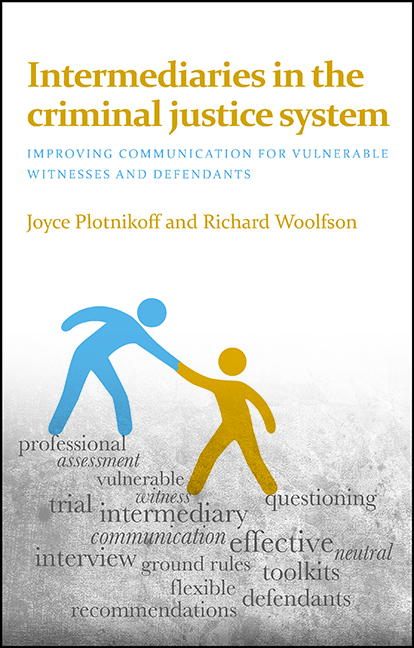 Intermediaries in the Criminal Justice System
Intermediaries in the Criminal Justice System Book contents
- Frontmatter
- Contents
- About the authors
- The Nuffield Foundation
- Acknowledgements
- Foreword
- one Introduction: a fresh pair of eyes
- two The intermediary scheme in England and Wales
- three Behind the scenes: planning to assess the witness
- four Assessment methods and involvement of the interviewer
- five Communication aids and stress reduction strategies
- six Contributing to the effectiveness of the police interview
- seven Negotiating professional space at the ground rules hearing
- eight Making the ground rules hearing effective
- nine ‘Every reasonable step’: preparation for giving evidence
- ten Cross-examination: research, case law, training and regulation
- eleven Cross-examination: intervention at trial
- twelve Cross-examination: challenges at the cutting edge
- thirteen The uneasy position of vulnerable defendants
- fourteen A new profession
- fifteen Conclusion
- References
- Index
- Table of cases
- Legislation
- Rules
- Practice directions
two - The intermediary scheme in England and Wales
Published online by Cambridge University Press: 08 March 2022
- Frontmatter
- Contents
- About the authors
- The Nuffield Foundation
- Acknowledgements
- Foreword
- one Introduction: a fresh pair of eyes
- two The intermediary scheme in England and Wales
- three Behind the scenes: planning to assess the witness
- four Assessment methods and involvement of the interviewer
- five Communication aids and stress reduction strategies
- six Contributing to the effectiveness of the police interview
- seven Negotiating professional space at the ground rules hearing
- eight Making the ground rules hearing effective
- nine ‘Every reasonable step’: preparation for giving evidence
- ten Cross-examination: research, case law, training and regulation
- eleven Cross-examination: intervention at trial
- twelve Cross-examination: challenges at the cutting edge
- thirteen The uneasy position of vulnerable defendants
- fourteen A new profession
- fifteen Conclusion
- References
- Index
- Table of cases
- Legislation
- Rules
- Practice directions
Summary
Of all the legislative special measures intended to assist vulnerable witnesses, intermediaries have the greatest potential to help those with a communication need to give their best evidence.
In the UK, 1% of people are estimated to have speech, language or communication problems sufficient to affect everyday functioning: this may be an underestimate (Enderby and Davies, 1989; Bryan et al, 1991). More than a million children suffer from speech, language and communication difficulties (Department for Children, Schools and Families, 2008); around 10% have a long-term speech, language and communication need (Law et al, 2000) or a clinically recognisable mental disorder (Office for National Statistics, 2005); and rates of childhood autism are around 1%, far higher than previous estimates (Baird et al, 2006).
The origins of the intermediary role date back to 1955. In that year, Israel introduced the ‘youth examiner’, a social worker responsible for questioning children (Libai, 1969); South Africa passed legislation in 1977 enabling an intermediary to relay lawyers’ questions to children; a few more recent intermediary provisions in other parts of the world are not in active use (Henderson, 2012). Introduction of a scheme is under active consideration in New South Wales and South Australia (communications to the authors, March 2015) and is being piloted in Canada (www.access-to-justice.org).
The intermediary concept was first proposed in England and Wales in 1987. Drawing on the Israeli model, legal scholar Glanville Williams proposed that a ‘child examiner’ relay lawyers’ questions to young witnesses while their evidence was videotaped before trial (Williams, 1987a, 1987b). The idea was quickly taken up by an advisory group chaired by Judge Thomas Pigot QC which recommended capturing all of children’s evidence, including cross-examination, before trial and that courts should have discretion to order that the advocate’s questions ‘be relayed through a person approved by the court who enjoys the child’s confidence’ (Home Office, 1989, para 2.32). Such use of an ‘interlocutor’ would be justified where ‘it is absolutely impossible for counsel to communicate successfully with a child’ (para 2.33).
The Criminal Justice Act 1991 drew on Pigot’s recommendations to make some children’s police videotaped interviews admissible as their evidence-in-chief, but children still needed to attend trial for cross-examination. Proposals for a child interlocutor and the pre-trial filming of cross-examination were disregarded.
- Type
- Chapter
- Information
- Intermediaries in the Criminal Justice SystemImproving Communication for Vulnerable Witnesses and Defendants, pp. 7 - 24Publisher: Bristol University PressPrint publication year: 2015


